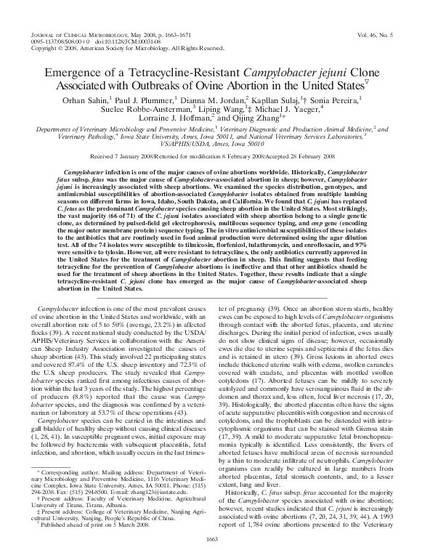
Article
Emergence of a Tetracycline-Resistant Campylobacter jejuni Clone Associated with Outbreaks of Ovine Abortion in the United States
Journal of Clinical Microbiology
Document Type
Article
Disciplines
Publication Version
Published Version
Publication Date
5-1-2008
DOI
10.1128/JCM.00031-08
Abstract
Campylobacter infection is one of the major causes of ovine abortions worldwide. Historically, Campylobacter fetus subsp. fetus was the major cause ofCampylobacter-associated abortion in sheep; however, Campylobacter jejuni is increasingly associated with sheep abortions. We examined the species distribution, genotypes, and antimicrobial susceptibilities of abortion-associatedCampylobacter isolates obtained from multiple lambing seasons on different farms in Iowa, Idaho, South Dakota, and California. We found that C. jejuni has replacedC. fetus as the predominant Campylobacter species causing sheep abortion in the United States. Most strikingly, the vast majority (66 of 71) of the C. jejuni isolates associated with sheep abortion belong to a single genetic clone, as determined by pulsed-field gel electrophoresis, multilocus sequence typing, and cmp gene (encoding the major outer membrane protein) sequence typing. The in vitro antimicrobial susceptibilities of these isolates to the antibiotics that are routinely used in food animal production were determined using the agar dilution test. All of the 74 isolates were susceptible to tilmicosin, florfenicol, tulathromycin, and enrofloxacin, and 97% were sensitive to tylosin. However, all were resistant to tetracyclines, the only antibiotics currently approved in the United States for the treatment of Campylobacter abortion in sheep. This finding suggests that feeding tetracycline for the prevention of Campylobacter abortions is ineffective and that other antibiotics should be used for the treatment of sheep abortions in the United States. Together, these results indicate that a single tetracycline-resistant C. jejuniclone has emerged as the major cause of Campylobacter-associated sheep abortion in the United States.
Rights
Works produced by employees of the U.S. Government as part of their official duties are not copyrighted within the U.S. The content of this document is not copyrighted.
Language
en
File Format
application/pdf
Citation Information
Orhan Sahin, Paul J. Plummer, Dianna Jordan, Kapllan Sulaj, et al.. "Emergence of a Tetracycline-Resistant Campylobacter jejuni Clone Associated with Outbreaks of Ovine Abortion in the United States" Journal of Clinical Microbiology Vol. 46 Iss. 5 (2008) p. 1663 - 1671 Available at: http://works.bepress.com/paul-plummer/18/

This article is from Journal of Clinical Microbiology 46 (2008): 1663, doi:10.1128/JCM.00031-08.